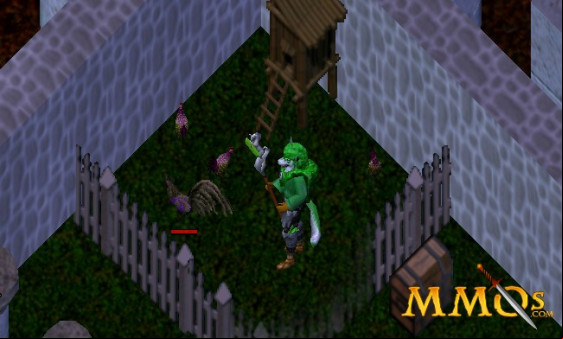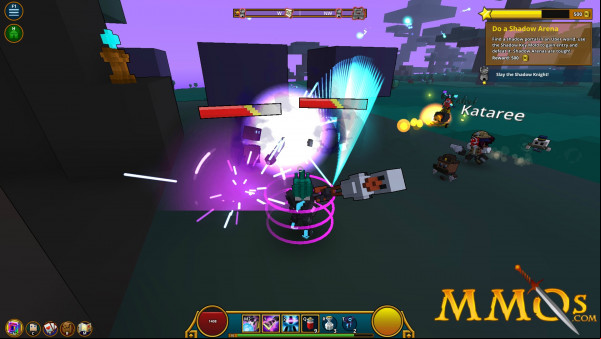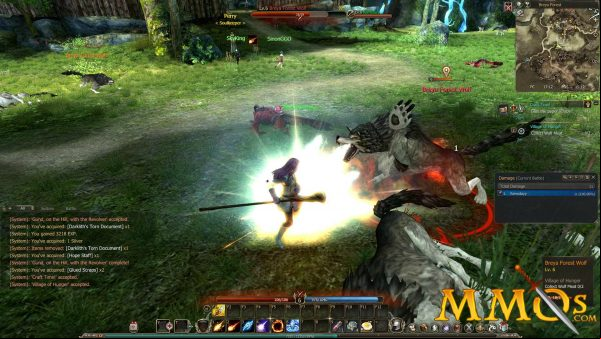What I Look For In MMOs

It’s been a while since I have been able to find a “traditional” MMORPG that I felt I could stick to in the long term. I don’t particularly dislike many of the games I’ve played, but they tend to do a poor job of drawing me in. Maybe the story is poor. Maybe the quests are dull and they bounce me back and forth between too many NPCs with very little proper gameplay. I’m finding more often than I would like that I really like a lot of combat systems and core gameplay concepts, but I particularly don’t like the journey.
I learned a long time ago that repetitive core gameplay isn’t the problem. I spent about a year and a half in Linkrealms, which, at the time, had maybe five dungeons—one of which was intended for newbies—and a grind that was so unbearable that even long-time players turned to botting. Replaying the same content dozens or even hundreds of times was inevitable. The dungeons were also public and part of unstructured content, so they could be run repeatedly if necessary and at any time you wanted, granted someone else wasn’t already running them.
The thing is that I don’t think I would have kept playing Linkrealms if it weren’t for the community. The game had a lot of problems, including but not limited to a severe lack of content, developers that insisted on catering to the players they didn’t have rather than the ones they did, and an absolutely dreadful business model that was pervasive throughout closed testing phases. In Linkrealms, I found friendships and rivalries. I caused drama among the small community. I eventually became a pillar of the community by writing the majority of the game’s Wiki and mentoring new players.
Then the community faded away. The developers continually drove one person after another to quit and, eventually, with the number of friends around dwindling, one final straw broke the proverbial camel’s back and I ended up leaving the game.
At one point, I began to think that the experience spoke to a single requirement I have to become engrossed in a game—a good community. I overlooked a lot of flaws in my time in Linkrealms simply because I enjoyed the small, close-knit community that would sit around in the bank and talk to each other. We would repeatedly stun new players with our ability to teleport onto the bank’s roof and our lavish items that were no longer available in-game—but didn’t provide any statistical advantages, mind you.
This element of MMORPGs is extremely lacking today. Players seem to communicate with each other solely for the purpose of getting something from other players, be it help or some item they need. If they aren’t asking for or providing an answer to some question, they largely don’t talk. Even in dungeons, where players are required to group, they queue up, stay silent unless someone messes something up, and leave as silently as they arrived.
I am of the mind that this is caused by a much more subtle change than people often attribute it to. Games today simply provide no incentive to interact with others for the grand majority of the game. You are taught everything you need to know by tutorials that hold your hand every step of the way. You can solo large parts of every game—with many parts expressly forbidding parties. Social features haven’t changed much at all in the past decade. The problem is that there isn’t much of a reason to use them.
I thought that this was my problem, but then I was introduced to Trove. Trove provides what is likely the least incentive to interact directly with other players of any game I’ve played. Each player has their own cornerstone they can drag around. All players in a dungeon at the moment that the boss is killed get credit for it. Many players would even mount up, rush through the dungeon to the boss and take him down while other players attempted to take out the mobs leading up to the boss. Due to the game’s reliance on potions, you can largely solo anything so long as your flask is filled. You could work with other players or indirectly have some sort of interaction through combat, but the incentive just isn’t there.
For some reason, I stuck with Trove. I often attribute this to the casual, jump in-jump out nature of the game, but it goes against what I had previously attributed to my staying in a game long-term. Is unstructured content really what I needed? Is the daily Star Bar what kept me playing Trove? I couldn’t answer either of those questions.
What I can say is that I am definitively tired of the modern quest grind, but this is largely not because of the quest grind itself. Perhaps exemplified best by games like Echo of Soul, many games are now starting to build their worlds around the quests, rather than the other way around. Areas are densely packed and shaped like large, winding corridors. Mobs that you need are distinctly placed in little bubbles along the way. It feels incredibly unnatural and it begins to wear on me. Both Trove and Linkrealms provided an escape from that feeling, providing naturally spaced out worlds.
When it comes down to it, perhaps it is the little things that matter most, the subtle design of the world or the quests a game starts you out with. Games are repetitive by nature and many MMORPGs feature very similar core gameplay. Perhaps the reason that many of us continue to bounce off of every game that comes out is less obvious than we initially thought. I’ve certainly discovered over time that what I look for in an MMO is less obvious than I had made it out to be.
What is something that you seek out in MMOs?







